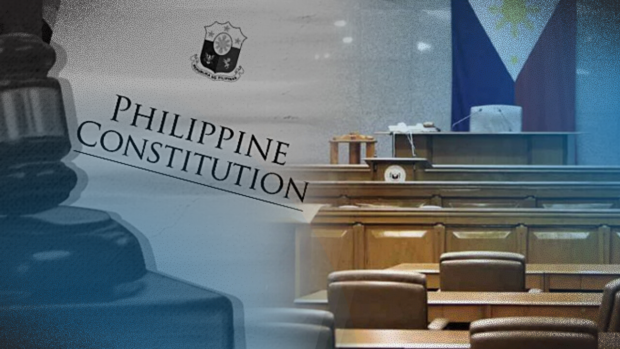Senate launches own bid to amend Constitution
MANILA, Philippines — Senate President Juan Miguel Zubiri on Monday led the filing of a resolution rewriting specific economic provisions of the 1987 Constitution, amid the controversy over the decades-old charter change agenda being revived once again under President Marcos’ administration.
“This is to avert a constitutional crisis between the House of Representatives and the Senate,” Zubiri told reporters after filing Resolution of Both Houses No. 6.
Speaker Martin Romualdez expressed his “unwavering support” for the Senate’s initiative. (See related story on this page.)According to Zubiri, the resolution resulted from his consultations with the House leader and a separate meeting with Mr. Marcos himself.
The Senate resolution is limited to “three topics on economic provisions. We are doing this to preserve the bicameralism of [Congress],” he said.
“[This is] to make it clear that there are no other planned provisions or amendments,” emphasized the Senate leader.
Article continues after this advertisementUnder the resolution, the proposed constitutional changes should only cover Section 11 of Article XII (National Economy and Patrimony), which requires 60-percent Filipino ownership of public utilities; Section 4 (2) of Article XIV (Education), which requires 60-percent Filipino ownership of educational institutions; and Section 11 (2) of Article XVI (General Provisions), which requires 70-percent Filipino ownership of any enterprise in the advertising industry.
Article continues after this advertisement“The nation’s economic policy must be reframed under the demands of this increasingly globalized age while still protecting the general policy of Filipino-first that guides the economic provisions of the Constitution,” read a portion of the resolution.
The resolution was co-authored by Senate President Pro Tempore Loren Legarda and Sen. Juan Edgardo Angara, who heads the Senate finance committee.
‘Castrating’ the Senate
In a news briefing, Zubiri did not hide his displeasure over what he saw as attempts to “castrate” the Senate’s authority in the pursuit of Charter change through people’s initiative.
He said the President himself had agreed that such an undertaking would only lead to unnecessary political hostilities.
The people’s initiative, Zubiri explained, would practically render the Senate powerless as an institution since this constitutional mode of amending the Charter would have the senators and district representatives vote as one congressional body.
Zubiri said the House, composed of nearly 300 lawmakers, would easily outvote the 24-member Senate.
“The propos[ed] subject of the people’s initiative could have led to a constitutional crisis, destabilizing our bicameralism and upsetting the system of checks and balances,” he said.
“While the Senate is vehemently opposed to a dilution of its participation in the task of reviewing the Constitution, we exercised all restraint because, in any conflict, it is always the people who stand to suffer the most,” he said.
Zubiri said the Senate and the House would separately convene on the proposed modifications of the Resolution of Both Houses No. 6.
According to him, the Constitution does not explicitly state that Congress should gather as one body.
‘Too divisive’
Constituent assembly “is just a name. The hearings and voting here are like separate assemblies. Does it say that we really have to meet? There’s none,” he said.
Zubiri also said he had a “colorful and vigorous discussion” with Romualdez when they met on Jan 11.
“Our discussion became quite heated,” he said without elaborating.
Legarda and Angara accompanied the Senate leader, while Romualdez was accompanied by the President’s son, House Senior Deputy Majority Leader Sandro Marcos. Special Assistant to the President Antonio Lagdameo Jr. also joined that meeting.
Zubiri said he also sought an audience with the President two days earlier regarding the people’s initiative campaign.
He said Mr. Marcos expressed concern about allegations that financial assistance was being dangled to potential signatories among the people in exchange for their signatures supporting Charter change.
“The President agreed with us that the proposal was too divisive and asked the Senate to instead take the lead in reviewing the economic provisions of the Constitution,” Zubiri said.
“In this way,” he added, “we can preserve our bicameral nature of legislation.”
Zubiri had earlier opposed any move to amend the Constitution. Reminded about his previous position, he clarified that he actually wanted changes in the Constitution, but it should only involve specific provisions on business ownership.
Since 1971
Charter change as a political agenda dates back to 1971 when the President’s father and namesake called a constitutional convention, which ultimately replaced the 1935 Constitution—the fundamental law in the almost three decades of the postwar Third Republic—with the 1973 Constitution, the basic law of the martial law regime.
After the Edsa People Power Revolution that ousted the older Marcos, that Charter was replaced by the 1987 Constitution upon its ratification in a plebiscite that year.
But only about six years into its effectivity, there were already attempts by succeeding administrations to amend or overhaul this Charter.
